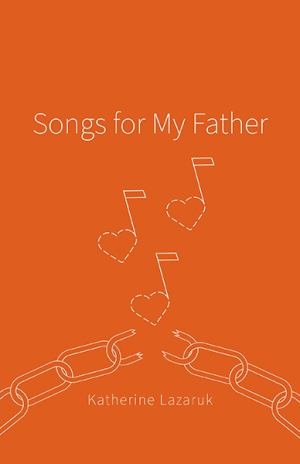Songs for My Father
Songs for My Father is a personalized book of poetry that is moved along by messages of hope for healing.
Katherine Lazaruk’s engaging poetry collection Songs for My Father grapples with the hardships and traumas of a childhood not centered by love.
Communicating memories of a childhood marked by alienation, these poems include poignant imagery, though many of them are also spare and unadorned. They recall a stifling home environment that is fleshed out in an innovative way—via the reluctance of the lines themselves, which seem hesitant to communicate, mirroring the discomfort surrounding the difficult subject matter itself.
In “The Intermediary,” a reference to the Styx in the land of the dead appears, repurposed as an apt metaphor for the speaker’s tortured relationship with her parents, in which her mother acts as an intermediary:
the darkness of him and
the terror of me.
Connected,
disconnected,
ferried secondhand messages,
triangulating tense terror…
The poem communicates the numbness and deathly calm of being trapped in an unhealthy family dynamic. Though it is short, the entry’s serious subject matter is handled well.
Throughout the book, inventive compound words are a frequent technique, used to describe evocative concepts and emotions: “they don’t have the power to hurtruledestroy me,” one poem declares, while another asserts that “they don’twon’tmightnever.” Another appeals to “mymother.” Musicality is achieved, too, in entries like “When Your Father Is Twelve,” whose rhythmic movements convey bombastic finality. After years of struggling, its narrator determines that her father is too emotionally stunted to have made room for her own childhood:
…your father is twelve
or maybe five,
emotionally speaking,
stagnantstuckyuck,
[so] you don’t get to be twelve
or five.
However, some of the collection’s lines take this spareness to an extreme; the effect is stifling. For example, in the terse entry “Say Something Good,” there is a suggestion that something momentous has taken place, but the audience is not enlightened; whatever the event was, it seems to be unmentionable.
Nonetheless, the book works toward concluding poems that reflect expanded self-awareness, with the collection having progressed from sharing a child’s perspective to reflecting that of a musing adult. And in the book’s memorable epilogue, there are lines that denote struggle and defiance—a sense of a voice “that can’t be so easily silenced.” Indeed, this epilogue makes meaning of all that the speaker endured; it demonstrates real healing through music and self-love, as well as an encouragement not to give up.
Songs for My Father is a personalized book of poetry that is moved along by messages of hope for healing.
Reviewed by
Laura Moreno
Disclosure: This article is not an endorsement, but a review. The publisher of this book provided free copies of the book and paid a small fee to have their book reviewed by a professional reviewer. Foreword Reviews and Clarion Reviews make no guarantee that the publisher will receive a positive review. Foreword Magazine, Inc. is disclosing this in accordance with the Federal Trade Commission’s 16 CFR, Part 255.

